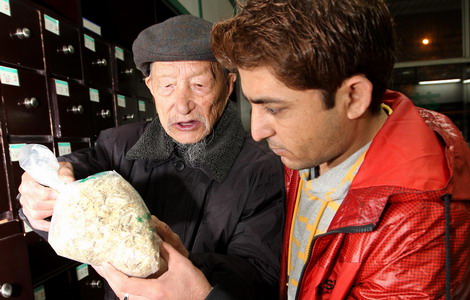|
 |
|
Ninety-three-year-old Hu Yisong, a traditional Chinese medicine doctor, teaches a student from Pakistan how to distinguish TCM materials at a drugstore in Nantong, Jiangsu province, in March. [Photo / China Daily] |
A Chinese traditional medicine has been authorized for sale in a European market for the first time, the Chinese Academy of Sciences announced on Wednesday.
Industry experts said the approval would lead the way for Chinese traditional medicine to enter the mainstream European market.
Di'ao Xin Xue Kang, a well-known herbal medicine produced by the Chengdu-based Di'ao Group, received marketing authorization from the Medicines Evaluation Board of the Netherlands, making it the first Chinese traditional drug to be identified as a therapeutic medicine in the European Union.
"This is an important step for TCM to enter mainstream markets of developed countries," Health Minister Chen Zhu said at a news conference organized by the Chinese Academy of Sciences in Beijing on Wednesday.
This first success was "proof that Chinese firms are capable of producing top-level medicines", he said.
Bai Chunli, president of Chinese Academy of Sciences, urged TCM research institutions to increase their focus on the European market now.
"As well as strengthening research, I hope they can also study the authorization requirements of different countries, so that more and more medicines will have access to the high-end market," he said.
Sang Guowei, vice-chairman of the Standing Committee of the National People's Congress, said that TCM could finally enter European "rightfully".
The certification of Di'ao Xin Xue Kang follows an EU ban on traditional Chinese medicine in May 2011, imposed to prevent unlicensed herbal medicines being sold as food supplements.
"This new authorization marks the first time that Chinese traditional medicine steps into the mainstream health market," said Zhang Boli, a member of the Chinese Academy of Engineering and president of the China Academy of Chinese Medical Sciences.
Zhang said another seven or eight Chinese TCM firms were trying to get access to the EU market.
"Maybe one or two of them will receive authorization next year. And this may lead to more applicants, as the influence of TCM expands on international market," he added.
Earlier reports said that the Guangzhou Qixing Pharmaceutical Company, the Foci Pharmaceutical Company in Lanzhou, and Tongrentang in Beijing are also striving for the EU market.
"The medicine is also the first herbal medicine that has entered the EU market from a country outside the EU member states," said Li Bogang, president of the Di'ao Group.
Li said the group took six years to obtain the certification from the Netherlands, although the medicine has been sold in China since 1988.
The group carried out two years of research on active substances in TCM drugs with the help of the Netherlands Organization for Applied Scientific Research.
"Without the help of the research organization, the application could have taken longer," Li said.
"Di'ao Xin Xue Kang contains only a single portion of traditional medicine, which makes the research much easier than for a compound medicine, so we decided to use it in our first attempt at the EU market."
Chen Keji, a member of the Chinese Academy of Sciences and chairman of the Chinese Association of Integrative Medicine, said identifying the active substances is essential when applying to enter the EU market.
"In China, we currently do not have so strict requirements on the study of active substances, especially in compound medicines," Chen said. "For example, a TCM doctor may add or take out some herbs in prescriptions for different patients."
"However, the healing principle is similar in TCM and Western medicine, so it's best we find out the effective parts in all medicines."
Liu Jun, chief engineer of the research department of Guangzhou Qixing Pharmaceutical Company, said the basic research into active substances started in 2011, and will take at least another year to finish.
"We are likely to promote our Xiaoyaowan and Biyanpian medicines next. Both are compound medicines," Liu said. "Compared with Di'ao Xin Xue Kang, the compound medicine is more complicated, so it takes time."
chengyingqi@chinadaily.com.cn
